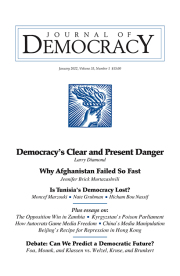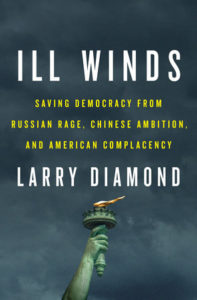 This is the darkest moment for freedom in half a century, according to Larry Diamond, senior fellow at the Hoover Institution and the Mosbacher Senior Fellow in Global Democracy at the Freeman Spogli Institute for International Studies at Stanford University. There is nothing inevitable about the triumph of democracy. In this new era, the strategies and choices of democratic states and leaders will have consequences that resonate for decades, he writes in his final essay as coeditor of the Journal of Democracy.
This is the darkest moment for freedom in half a century, according to Larry Diamond, senior fellow at the Hoover Institution and the Mosbacher Senior Fellow in Global Democracy at the Freeman Spogli Institute for International Studies at Stanford University. There is nothing inevitable about the triumph of democracy. In this new era, the strategies and choices of democratic states and leaders will have consequences that resonate for decades, he writes in his final essay as coeditor of the Journal of Democracy.
Years before democracy’s present headwinds, the limits and deep contradictions of democracy in Latin America, prompted him to begin worrying about the problem of democratic shallowness and inauthenticity. As Francis Fukuyama has stressed, good governance—or at least initially decent, as opposed to predatory, governance—is key to democracy’s long-term prospects, Diamond writes in Democracy’s Arc: From Resurgent to Imperiled.
Agency matters
But how does good governance emerge out of historical and social circumstances of weak laws, courts, bureaucracies, and other formal institutions? he asks:
This can only be done by the conscious work of leaders, organizations, and reform coalitions, sometimes with the assistance of other states and outside institutions. Political and civic agency, strategy, and choice—or to use a word strangely rare in political science these days, “leadership”—matter. A healthy appreciation for the role of agency counsels us against a false sense of security about democracy’s fate—that once “consolidated,” democracies are inevitably here to stay.
 We have recently entered a more ominous phase of the democratic recession, evocative of Huntington’s reverse waves, Diamond adds. More troubling than the aggregate numbers are the qualitative trends and where they are taking place, including the world’s most populous democracy, India, and the other big and influential democracies of the global South are also in trouble, due to authoritarian populist leaders (Brazil and Mexico) or weak institutions and rising social stresses (South Africa and Indonesia).
We have recently entered a more ominous phase of the democratic recession, evocative of Huntington’s reverse waves, Diamond adds. More troubling than the aggregate numbers are the qualitative trends and where they are taking place, including the world’s most populous democracy, India, and the other big and influential democracies of the global South are also in trouble, due to authoritarian populist leaders (Brazil and Mexico) or weak institutions and rising social stresses (South Africa and Indonesia).
But no global development of the twenty-first century has been more damaging to the cause of freedom than the emergence of the People’s Republic of China (PRC) as the world’s next superpower, he observes. As its geopolitical weight and resources swell, China is deploying classic Communist Party “united front” tactics to penetrate and coopt the soft tissues of democracy—universities, think tanks, research centers, news media, the arts, corporations, community organizations, political parties, and local governments – with three principal goals:
1) to steal and appropriate Western technology in a drive toward global economic and military dominance;
2) to control the narrative about China by censoring and intimidating criticism of its human-rights violations and external belligerence, while promoting a benign view of the regime; and
3) to mobilize exchange partners and united-front allies (witting or not) to embrace rather than resist China’s hegemonic pretensions, and to lobby their governments for policies that will expedite this seismic shift in global power.
 Can the world’s democracies manage their divisions and rally their resolve to meet the challenge posed by resurgent authoritarianism? Diamond ponders, citing the well-known maxim from Antonio Gramsci*: “Pessimism of the intellect, optimism of the will.” Only a clear-eyed recognition of the depth of the current peril can generate the necessary will, he concludes. RTWT
Can the world’s democracies manage their divisions and rally their resolve to meet the challenge posed by resurgent authoritarianism? Diamond ponders, citing the well-known maxim from Antonio Gramsci*: “Pessimism of the intellect, optimism of the will.” Only a clear-eyed recognition of the depth of the current peril can generate the necessary will, he concludes. RTWT
The Journal of Democracy’s just-released January 2022 issue IS available for free on Project MUSE through February 15.
*Forgive the pedantry, but just as it was Albert Camus – not Winston Churchill – who first said democracy is the worst form of government except for all the others, so it was the French writer and Nobel laureate Romain Rolland who first advocated “pessimism of the intelligence, which penetrates every illusion, and optimism of the will… this natural bravery that is the flower of a good people… [who] struggle over and above suffering.” To give Gramsci his due, he did distill the idea and credited Rolland.







